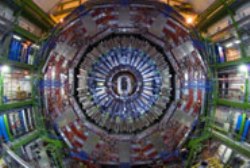Oct 4 2012
The eight academics in the University’s particle physics group conduct experiments using the giant CMS and LHCb detectors, deep underground on the Swiss-French border.
 "The CMS detector at CERN"
"The CMS detector at CERN"
Using several different techniques, data recorded in the experiments are compared to the predictions of the Standard Model, the currently-accepted theory of fundamental particles and forces. This model, pieced together over thirty years, is believed to give way to a simpler and more elegant set of laws at very high energies.
Dr Dave Newbold, group leader, said: “The discovery this summer of a Higgs-like particle at the LHC has opened up a huge range of new research. Over the next few years, our job is to find out what this tells us about the ‘dark matter’ which dominates our galaxy, and the origins of the Universe we live in today.”
A four-year £3.9 million grant from the Science and Technology Facilities Council will allow the group to continue its analysis of data from the two experiments, and to upgrade the detectors to allow the analysis of collisions at higher energy and intensity. After a two-year upgrade programme in 2013-4, the LHC will be able to collide particles at twice the current energy, giving the possibility to directly produce and examine dark matter particles, or to create new and even heavier versions of the Higgs boson. Bristol academics and research staff lead key areas of this international research programme.
Dr Jonas Rademacker has also been awarded an individual €1.4 million five year start-up grant by the European Research Council. This funding will support a programme of new and precise measurements of the differences between matter and antimatter, crucial in fully exploring physics beyond the Standard Model.
“All known laws of physics predict that matter and antimatter should have populated the early Universe in equal measure, whereas antimatter is incredibly rare today,” said Dr Rademacker. “Measurements from LHCb will help us tackle one of the biggest mysteries in physics.”
In addition to its work at the LHC, the group is also active in the preparation of new experiments at CERN and other international laboratories, and in the transfer of particle physics detector and computing technology to other areas of science and industry.